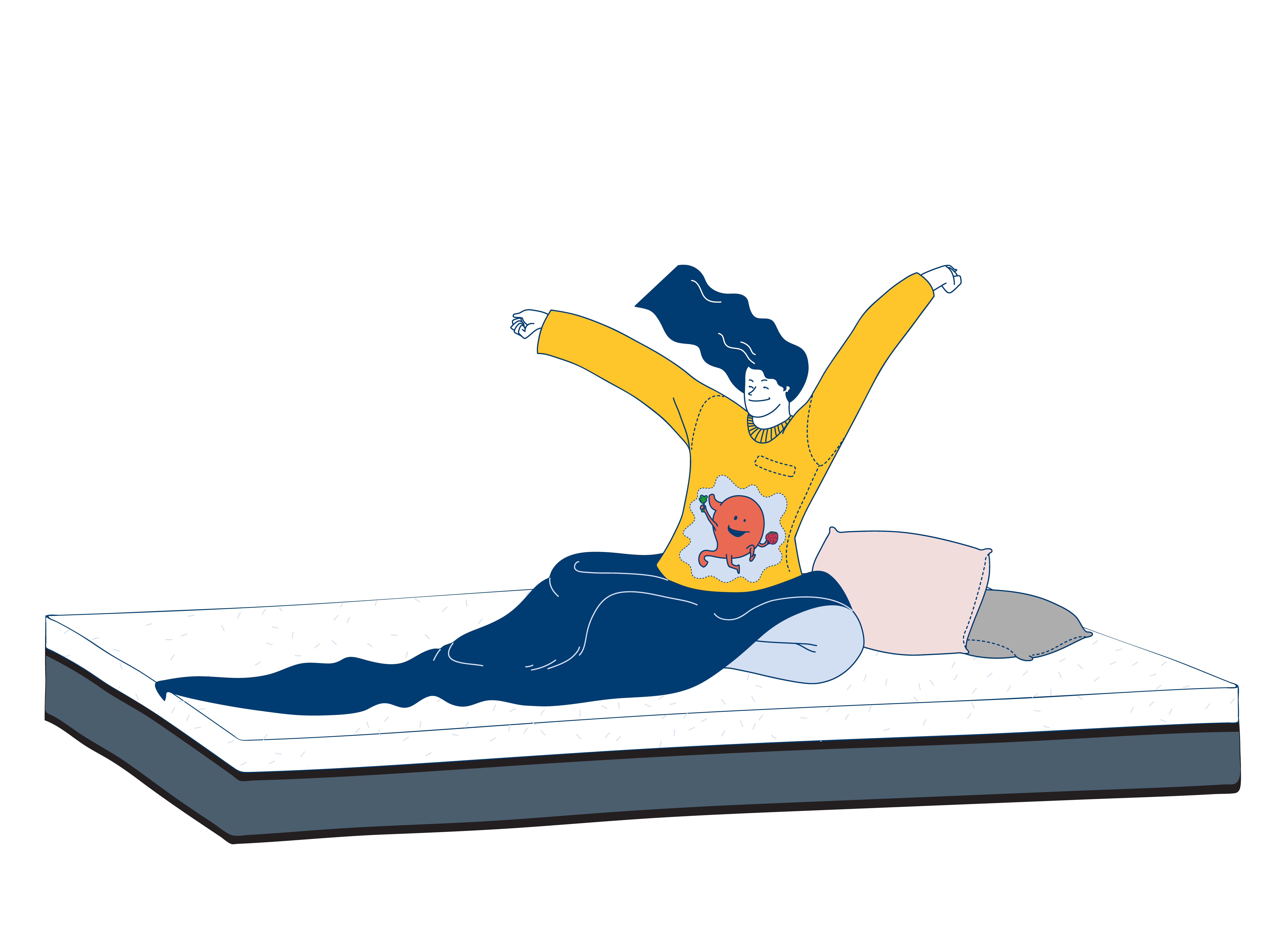Going to bed with stomach cramps, pains or even indigestion can be extremely uncomfortable and disrupt our sleep. If this sounds like you, then keep reading! We’ve brought in Shim Ravalia, the ultimate gut stress expert, to tell us about the connection between our gut and sleep.
There are many reasons why we may not be able to get a good night’s sleep. It could be physical stress such as an injury, we could also be overthinking about things, having a late dinner, watching TV till late or drunk a lot of caffeine/alcoholic drinks in the day.
Some of these reasons may be obvious and sometimes we can bring our sleep back to balance and have a good night’s sleep. However, what is becoming more and more apparent is our Digestive Health, in particular is how our gut bacteria behaves in our digestive tract.
What Is the Gut and How Does It Work?
The Gut is responsible for getting our body into good working order every day. Digestion actually starts in the mind and goes through the Cephalic phase where we see, hear and smell about food. We then chew our food and allow it to go down the oesophagus to enter the stomach. This is where the stomach acid and juices from the liver and gallbladder come in to disinfect the food and break it down even more to pass it along the small and large intestines. Eventually this gets passed through as waste once the body has taken the nutrients it needs.
The Gut is also known as the second brain and can work independently without needing permission from any other systems in the body. It has more than 100 million brain cells so it is very powerful in thinking for itself. The vagus nerve is embedded in and around the gut too allowing 90% of information to be carried from the gut and brain also known as the gut feeling. The foods we eat do affect our mood; whether we want to feel happy, feel pleasure, feel good is determined by the quality of our gut health because 95% of serotonin (Happy chemical) is in the gut.

How Does Gut Health Affect the Quality of Sleep?
We all have a circadian rhythm which is our body’s natural internal clock that helps start our day (rise with the sun) and rest and recover and get a good night’s sleep every night. If the gut starts to become dysfunctional and become stressed, it can very easily affect our sleep patterns.
The following factors can affect the gut to become dysfunctional:
- High stress – if we are not managing our stress properly, our body is in constant fight, flight or freeze mode allowing very little opportunity to rest and recover at night.
- Poor diet – if our diets are take outs majority of the time, processed foods, high in sugar then this will definitely suppress our sleep hormone known as Melatonin.
- Heavy meals – if our meal timings and quantity is off and more than usual, this puts the digestive system under more pressure to process the foods meaning it has to work over time to get the job done. This results in poor sleep.
Just high stress levels and a poor diet alone can cause us to feel overwhelmed, lack focus and concentration, anxiety and overthinking. All of these emotions can fester and keep us awake at night.
There has been many studies and research in the last 5 years giving us an insight into how gut bacteria can affect our circadian rhythm. Gut bacteria are microorganisms that live in the digestive tract of humans. They play important roles in the body including communicating with other systems, breaking down and utilising fats, proteins and carbohydrates as well as producing certain vitamins.
Therefore, it’s no surprise that a lack of sleep and appetite impacts how our gut bacteria behave. Our gut bacteria need diversity meaning it needs a range of good quality foods consistently to have a good supply of good and bad bacteria in our digestive tract. If we are sleep deprived, this can decrease our appetite leading us to crave more processed, sugary foods which can impact the diversity of our gut bacteria.
How Can We Improve Our Gut Health to Improve Our Sleep?
First and foremost, we must adopt a better diet consisting of more green leafy, cruciferous vegetables, using good quality fats like coconut oil on high heat and olive oil for salad and marinades. We should also consider better quality lean meats and proteins and good sources of carbohydrates too.
In a world where we are all switched on, we need to get into a habit of having good sleep hygiene, making sure we switch off my digital devices 60 to 90 mins before bed allowing our body to get ready for a good night’s sleep.
The main thing to take into consideration is in order to live a healthier lifestyle with good quality sleep, we must make sure we strive to balance with our foods most of the time.
About the Author
International Speaker, Health Coach, and Gut Stress Expert, Shim Ravalia helps highly driven women go from too stressed for success, to healthy habits that create a lifestyle of a better work life balance so that they can get things done, feel amazing and make more money.
Shim holds 2 degrees in Sports Therapy, Health, Fitness & Rehabilitation, Holistic Coaching, and all the other geeky science stuff that is just really complex but so cool to learn.
With a combined 13 years of experience as a Personal Trainer, Sports Therapist and a Gut Stress Expert, Shim has helped over 5,000 people get to the root of their health challenges inside out using her 7 steps of The Stressed to Success System.



